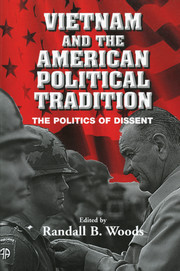Book contents
- Frontmatter
- Contents
- List of Contributors
- Introduction
- Anti-Imperialism in U.S. Foreign Relations
- World War II, Congress, and the Roots of Postwar American Foreign Policy
- The Progressive Dissent: Ernest Gruening and Vietnam
- “Come Home, America”: The Story of George McGovern
- Congress Must Draw the Line: Senator Frank Church and the Opposition to the Vietnam War and the Imperial Presidency
- Dixie's Dove: J. William Fulbright, the Vietnam War, and the American South
- Advice and Dissent: Mike Mansfield and the Vietnam War
- The Reluctant “Volunteer”: The Origins of Senator Albert A. Gore's Opposition to the Vietnam War
- A Delicate Balance: John Sherman Cooper and the Republican Opposition to the Vietnam War
- Friendly Fire: Lyndon Johnson and the Challenge to Containment
- Richard Nixon, Congress, and the War in Vietnam, 1969–1974
- Index
“Come Home, America”: The Story of George McGovern
Published online by Cambridge University Press: 21 November 2009
- Frontmatter
- Contents
- List of Contributors
- Introduction
- Anti-Imperialism in U.S. Foreign Relations
- World War II, Congress, and the Roots of Postwar American Foreign Policy
- The Progressive Dissent: Ernest Gruening and Vietnam
- “Come Home, America”: The Story of George McGovern
- Congress Must Draw the Line: Senator Frank Church and the Opposition to the Vietnam War and the Imperial Presidency
- Dixie's Dove: J. William Fulbright, the Vietnam War, and the American South
- Advice and Dissent: Mike Mansfield and the Vietnam War
- The Reluctant “Volunteer”: The Origins of Senator Albert A. Gore's Opposition to the Vietnam War
- A Delicate Balance: John Sherman Cooper and the Republican Opposition to the Vietnam War
- Friendly Fire: Lyndon Johnson and the Challenge to Containment
- Richard Nixon, Congress, and the War in Vietnam, 1969–1974
- Index
Summary
The Senate chamber was nearly empty on the afternoon of September 24, 1963. George McGovern, the young South Dakotan who had the floor, could have counted his listeners in a single glance if he had thought to do so. But first-year junior senators from states with small populations knew not to expect large audiences. At forty-one, his tall frame was still spare, and suggested physical strength. Receding hair made his lean, rectangular face look a little more seasoned than it otherwise might have, though his overall mien was professorial. As he spoke, his voice was strong and his diction clear, but the tone was generally unvarying. Journalists described him as “mild mannered,” “a gentle intellectual,” or “a shy and modest professor” who “speaks with a Western twang.” Yet his future prestige as a commentator on national affairs would stand less on how he sounded than on what he said, for people were impressed by his unaffected eloquence and earnestness and by the persuasiveness of his arguments.
For a politician, his résumé was somewhat unusual. He was neither a lawyer nor a businessman, nor was he wealthy. His family background was deeply rooted in the church, and he was a highly decorated war hero. He hailed from a province of the Middle Border and held a Ph.D. from a leading university. He possessed the “all-American” asset of an attractive family – a smart and beautiful wife, four daughters, and a son.
- Type
- Chapter
- Information
- Vietnam and the American Political TraditionThe Politics of Dissent, pp. 82 - 120Publisher: Cambridge University PressPrint publication year: 2003

